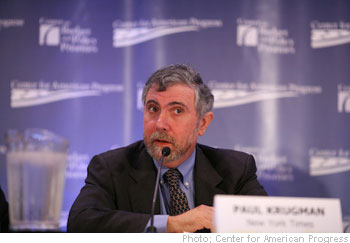 The case for Ben Bernanke’s reappointment was weak to start with, weakened with his hearings, and is now held together by string and some phone calls from the White House. Bernanke is an airline pilot who pulled off a miraculous landing, but didn’t do his preflight checks and doesn’t show any sign of being more careful in the future – thank him if you want, but why would you fly with him again (or the airline that keeps him on)?
The case for Ben Bernanke’s reappointment was weak to start with, weakened with his hearings, and is now held together by string and some phone calls from the White House. Bernanke is an airline pilot who pulled off a miraculous landing, but didn’t do his preflight checks and doesn’t show any sign of being more careful in the future – thank him if you want, but why would you fly with him again (or the airline that keeps him on)?
The support for Bernanke in the Senate hangs by a thread – with Harry Reid providing a message of support, albeit lukewarm, after the markets close. The White House is telling people that if Bernanke is not reconfirmed there will be chaos in the markets and the economic recovery will be derailed. This is incorrect.
The danger here is uncertainty – the markets fear a prolonged policy vacuum. Fortunately, there is a way to address this. Ben Bernanke should withdraw and the president should nominate Paul Krugman to take his place.
Paul Krugman is an expert on monetary policy – he wrote the classic paper on balance of payments crises (and probably could have got the Nobel Prize just for that), his work on Japan in the 1990s shaped everyone’s thinking of how to handle potential deflation, and his assessment of the crisis and needed response in fall 2008 was right on the money.
Krugman is known to many academics as a trade theorist and as a pioneering modeler of growth with increasing returns. But just because Keynes wrote eloquently on Indian currency reform did not prevent him from also understanding what had gone wrong with the world economy – and how to substantially fix it.
Krugman also has exactly the paper trail that you would like to see from any potential Fed chair. He has written pointedly and with complete clarity about all the leading policy issues of the day.
There is no question where he stands, for example, on “too big to fail” financial institutions: he’s opposed and would push for fundamental financial reform and tough oversight.
Big banks, without doubt, would be appalled. But the “Greenspan fallacy” was always that no one else could do his job and even considering an alternative would be destabilizing. Look at the mess that got us into.
What the markets really care about is what the Fed does, with regard to both interest rates and regulation. What we need is a Fed chair who can be trusted to nuture the recovery – find me the business person who is opposed to that – without allowing too big to fail institutions to remain so big and so dangerous that they can destabilize the system.
And don’t think that Krugman can’t raise interest rates if he really sees inflation coming – even if the danger, for example, is not picked up by conventional measures. He is tough minded, not afraid to take stands long before they are fashionable, and confident that others will soon come to their senses.
Would he be a “populist” choice? Absolutely not. He would be a popular choice, no doubt, but he is also many technocrats’ favorite thinker and a person whose credentials and proven policy opinions speak for themselves. No one would question the independence of the Fed with him at the helm.
Would Krugman be opposed by the Republicans? Yes, potentially. And there could be quite a fight in the Senate – entirely of the Republicans making. But if they oppose his appointment – despite his qualifications and in the face of our weak economy – what signal would that send about their priorities?
The president said on Thursday he is (finally) willing to fight the big banks. He’s an effective fighter and, with enough support, he can win. But is any part of his agenda at this point really advanced by winning the reappointment of Ben Bernanke?
- Bulenox: Get 45% to 91% OFF ... Use Discount Code: UNO
- Risk Our Money Not Yours | Get 50% to 90% OFF ... Use Discount Code: MMBVBKSM
Disclaimer: This page contains affiliate links. If you choose to make a purchase after clicking a link, we may receive a commission at no additional cost to you. Thank you for your support!


This is certainly the most ridiculous thing ever published. Krugman cannot be controlled politically, he is a macroeconomist who believes in general equilibrium (when BOTH concepts have been thoroughly discreted), and he has NO idea about what should be done RIGHT NOW to prevent unemployment from exploding.
The author is as stupid and confused as Krugman–that’s the reason he endorses Krugman.